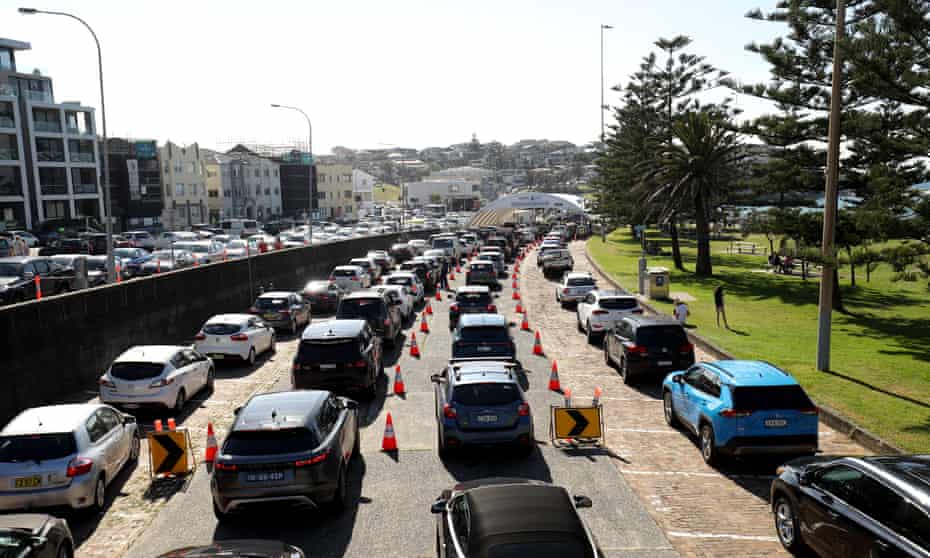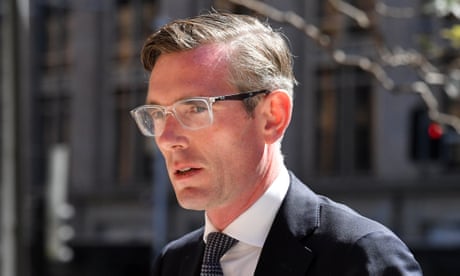Extract from The Guardian
In the pre-Christmas minefield of Covid risk assessment, people want to do the right thing. But we need more information.

Long lines for Covid tests in Sydney as the NSW government says it will not reintroduce public health measures are adding to the stress of a tired and fed-up population.
We have been here before. The thing that connects this moment with the early stages of the pandemic is confusion, panic and people going their own way, doing their own thing.
On Monday, as the Omicron outbreak surged, New South Wales premier, Dominic Perrottet, announced his government was not reintroducing public health measures, such as indoor mask mandates. Instead he called for people to exercise personal responsibility.
“We are treating the people of our state like adults,” he said.
At the same time, the prime minister keeps telling us the era of governments telling us what to do constantly is ending.
“We have got to move to the next phase of how we live with this virus,” Scott Morrison said on Tuesday. “The time for that heavy hand is behind us.”
In the last years of the Roman republic, lawmaker Cicero famously wrote, “Salus populi suprema lex” – which translates as “the health of the people is the supreme law”.

But you could say in Australia there has been a twist on this maxim. Now “the choice of the people is the supreme law”.
When you have more individual choice, as we do now, you introduce a massive element of chaos and the unknown into the mix, as people go their own way. Add Christmas and widespread travel and socialising, and it has been a hot mess of a week, where people don’t really know what to do, or how they should manage it – just like the early days of March 2020.
Some people have cancelled everything and are lying low, others are, in the words of Morrison on Tuesday, “keeping calm and carrying on”.
Speaking to friends and colleagues a few days before Christmas, I’ve heard many tales of restaurant bookings cancelled; driving around the suburbs trying to buy rapid testing kits; being pinged as a contact; friends cancelling plans because they had been pinged; work Christmas parties cancelled; hours spent in testing queues; waiting days to get results back; asking people to do a rapid test before a dinner party; interstate Christmas plans up in the air; sick kids who may have Covid; trying to bring forward booster shots; and calculations about risks to elderly or sick relatives made with a variety of ever-changing inputs.
And this not a fresh, spritely group of people dealing with pre-Christmas chaos – but rather people who are bedraggled, down to their final brain cells, longing for a normal Christmas, who have endured two long years of pandemic, who are tired, fed up and dispirited. The calculus they must make this week as part of their compact with the state to take “personal responsibility” is overwhelming.
I speak to one friend, Jonno Seidler, who lives in Sydney. It’s a typical pre-Christmas story. “One of my best friends just got pinged who I recently saw, so I guess we’ll get a rapid test. I just had a work event where we had to get a test – because someone there was playing at a music festival. A lot of my friends are going to weddings and being told to take a test before the wedding. This week a lot of people are just staying home.”
Seidler reckons people will largely do the right thing if given personal responsibility, “There’s a collective sense of social responsibility – the people who broke the rules – like the Byron guy, they are outliers. (If you broke the rules) you would be publicly shamed out of existence.”
Another friend, Kate Schlunke, was driving down from the mid-north coast of NSW to Sydney for some pre-Christmas parties when she changed her mind about visiting Sydney.
“There’s a party we have tomorrow where we have to catch public transport to get there, and there’s a pregnant woman and young kids who will be there. I don’t want to infect anyone and I don’t want to get infected – and I don’t want to be a close contact just before Christmas Day. A lot of people are holing up at the moment. You are only as safe as the most irresponsible person at the party. Right now we are adjusting our plans and need to do our own risk assessments for everything.”
On Twitter on Monday I asked, “How do people feel about individual responsibility versus government intervention” – and in the hundreds of replies a lot of people said that it did not have to be an either/or. As the pandemic progresses and things get possibly worse over winter, setting will change – and the levers of government intervention and levels of personal responsibility will probably shift according to the seasons, the variant and other risk factors.
But there were also a lot of responses from people who wished that NSW had just hung on to the indoor mask mandate and widespread use of QR codes until more was known about Omicron.
People generally want to do the right thing – but before we get handed personal responsibility – a few things should have happened first. People need to make informed decisions about their risks and the risk they pose to others, based on hard data.
That data is – do I have Covid? Am I a close contact? Was I at an exposure site? This data should help us through the minefield of pre-Christmas decision making – and should be available to us via the availability and affordability of rapid lateral flow tests and more testing clinics, with more available staff. This data is also theoretically available when we check in and use QR codes. Which, of course, have been scrapped in many settings in NSW. Personal responsibility only works when a person is reasonably informed about the risks.
No comments:
Post a Comment